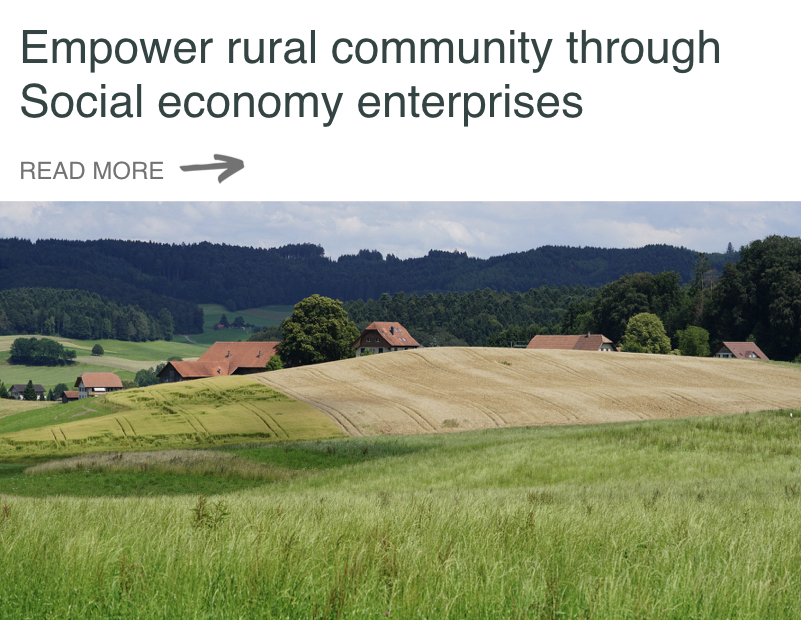Anastasia Costantini, Senior Expert SDGs and Green Transition
Empower rural community through Social economy enterprises
“Our rural areas are the fabric of our society and the heartbeat of our economy. The diversity of landscape, culture and heritage is one of Europe’s most defining and remarkable features. We will cherish and preserve our rural areas and invest in their future.” President von der Leyen [1], European Commission (2020). In 2020, the European Commission initiated to develop a new long-term vision for rural areas to create a shared European vision for its vibrant, connected and sustainable development by 2040.
Rural areas account for more than 341 million hectares, representing 83% of the total EU area. Still, these remote communities have the lowest population shares in age groups below 50 years old [2]. The whole rural economy is a much more complex ecosystem of activity than farming and forestry. It is about services, it is about quality of life, it is about creative economy and tourism. Empowering rural areas also means fostering sustainable urbanisation.
Social economy enterprises seem to be appropriate to promote innovative entrepreneurial solutions for providing services or goods to people or communities whose needs were met neither by private nor by public providers [3]. Not surprisingly, they are subject to special attention from the European Commission, particularly in recent years.
They can contribute to the socio-economic development of rural areas from different perspective [4]:
- providing access to basic services for all (social services, education, healthcare);
- fostering a more balanced use of local resources;
- promoting inclusive governance models that enable local communities in making strategic decisions;
- enhancing the inclusion in the labour market of minority and vulnerable groups and others remaining excluded from opportunities to generate incomes.

In recent years, Diesis Network conducted a study to understand the contribution of social economy enterprises in developing alternative food systems. This study allowed analysing the impact of social economy enterprises in rural areas. Various cases have shown how they could create solid and mutually supportive linkages between rural and urban areas to realise smart, circular and inclusive development [5].
Based on the previous study, we are now focusing on analysing social economy enterprises models’ on-the-ground activities in the rural area. The research might enhance endogenous potential (economic sustainability) and the recovery of degraded or abandoned natural resources (environmental sustainability), embedded the creation of a network among local communities, authorities, and other private stakeholders [6].
The results will be presented during the “Unlocking the potential of social economy enterprises in rural area” organised by Diesis Network in September 10th, in the framework of the National Dissemination Meeting of COST Action 18213: Rural NEET Youth Network: Modeling the risks underlying rural NEETs social exclusion.
[1] EC, DG AGRI, Strategic Plan 2020-2024. https://ec.europa.eu/info/system/files/agri_sp_2020_2024_en.pdf
[2] EUROSTAT, Rural Areas in numbers, 2018
[3] Defourny, J., & Nyssens, M..Social innovation, social economy and social enterprise: What can the European debate tell us. In F. Moulaert, D. MacCallum, A. Mehmood, & A. Hamdouch (Eds.), The international handbook on social innovation (pp. 40–52). Cheltenham: Edward Elgar.2013
[4] Bencheva N.;Terziev,V.; Tepavicharova, M.; Stoeva, T.;Arabska,E.The role of social entrepreneurship for rural development. Agricultural Sciences Volume 9 Issue 21 2017
[5] Costantini, A.; Pastorelli, G.; Sebillo, A. How Social Enterprises Contribute to Alternative Food Systems. CIRIEC No. 2019/14
[6] Mastronardi, L.; Giaccio, V.; Romagnoli, L. Community-Based Cooperatives as innovative partnership to contrast inner areas decline. Econ. agro Aliment. Food Econ. 2019
